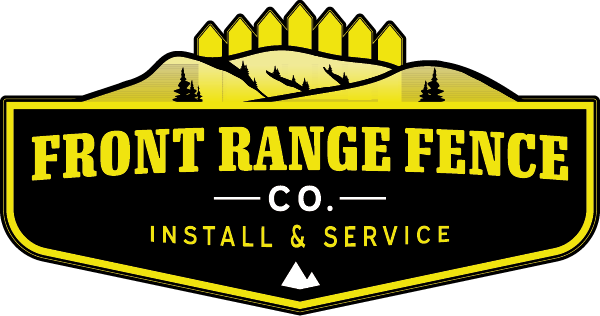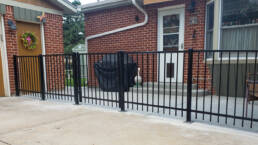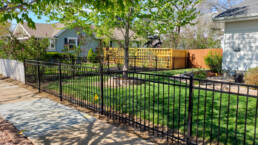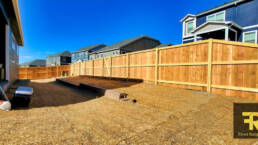Welcome to Front Range Fence’s Ultimate Guide to Residential Fencing! As a homeowner in the Denver area, you understand the importance of a well-designed residential fence. A beautifully crafted fence not only enhances the aesthetic appeal of your property but also provides security and privacy for you and your family.
In this comprehensive guide, we will walk you through everything you need to know about enhancing your home with a beautiful residential fence. From choosing the right material and design to understanding local regulations and ensuring longevity, we’ve got you covered. Let’s get started on your journey to finding the perfect fence for your home!
Choosing the Right Material
A crucial step in enhancing your home with a beautiful residential fence is selecting the right material. Let’s explore some of the most popular fencing materials:
- Wood
Wooden fences offer a classic and timeless look. They are versatile, can be easily customized, and provide excellent privacy. However, they require regular maintenance, such as staining or painting, to protect against weathering and rot. - Vinyl
Vinyl fences are known for their low maintenance and durability. They come in a variety of styles and colors, are resistant to rot and decay, and are easy to clean. While vinyl fences tend to be more expensive upfront, they require minimal maintenance over time. - Chain-link
Chain-link fences are affordable, durable, and require little to no maintenance. While they may not offer as much privacy as other types of fences, they are excellent for security and pet containment. With various gauges and coatings available, you can customize your chain-link fence to suit your needs. - Iron
Iron fences provide an elegant and sophisticated look to any home. They are incredibly durable, resistant to rust, and can be customized to fit any design. However, they may require regular maintenance to prevent rust and corrosion. - Composite
Composite fences offer the natural beauty of wood with the durability of plastic. They are resistant to rot, decay, and insects, making them an excellent low-maintenance option. While they may be more expensive upfront, composite fences often pay for themselves over time with reduced maintenance costs.
Considerations for climate, neighborhood regulations, and personal style play a significant role in choosing the right material for your residential fence.
Design and Style Options
Now that we’ve explored the various materials available for residential fencing, let’s dive into the design and style options. Choosing the right design is essential not only for aesthetic purposes but also for functionality and cohesiveness with your home’s architecture and surroundings.
Traditional vs. Contemporary Styles
Traditional Styles
Traditional fence styles, such as picket and ranch rail fences, offer a timeless and classic look. They add charm and character to your home while providing security and defining your property boundaries.
Contemporary Styles
For a more modern look, consider contemporary fence styles, such as horizontal slat or geometric designs. These styles offer a sleek and minimalist aesthetic, perfect for complementing modern home designs.
Fence Height and Spacing Considerations
When choosing the height and spacing of your fence, it’s essential to consider both aesthetic and practical factors. Here are some things to keep in mind:
- Privacy: Taller fences provide more privacy, while shorter fences offer a more open and welcoming feel. Consider your privacy needs when determining the height of your fence.
- Security: A taller fence with minimal spacing between slats or panels can enhance security by deterring intruders.
- Regulations: Be sure to check local regulations regarding fence height and spacing to ensure compliance.
Decorative Elements and Custom Designs
Incorporating decorative elements and custom designs can add personality and uniqueness to your residential fence. Here are some options to consider:
- Arbors and Gates: Arbors and gates can serve as stunning focal points for your fence, adding elegance and charm to your outdoor space.
- Lattice Toppers: Lattice toppers can add a decorative touch to your fence while allowing for additional airflow and light.
- Custom Designs: Work with a professional fence contractor, such as Front Range Fence, to create a custom design that reflects your personal style and complements your home’s architecture.
Color Options and Finishes
Choosing the right color and finish is essential for achieving the desired look for your residential fence. Consider the following options:
- Natural Wood Finish: If you choose a wooden fence, you can opt for a natural wood finish to showcase the beauty of the wood grain.
- Painted Finish: Painting your fence allows you to customize the color to match your home’s exterior or outdoor decor.
- Vinyl Options: Vinyl fences come in a variety of colors, allowing you to choose the perfect hue to complement your home.
By carefully selecting the design and style of your residential fence, you can enhance the beauty and functionality of your outdoor space.
Understanding Local Regulations
Before installing a residential fence in the Denver area, it’s crucial to understand the local regulations and guidelines. Failure to comply with these regulations could result in fines, or worse, having to remove or modify your fence. Let’s explore some key considerations:
Denver Area Fencing Regulations and Permits
- Height Restrictions: Check the maximum allowable height for fences in your area. In Denver, residential fences typically cannot exceed six feet in height.
- Setback Requirements: Understand the setback requirements, which dictate how far your fence must be from the property line or adjacent structures.
- Material Restrictions: Some neighborhoods may have restrictions on the type of materials allowed for residential fencing. For instance, certain materials may be prohibited or restricted in historic districts.
- Permit Requirements: Determine whether a permit is required before installing your fence. In Denver, a permit is typically required for fences over six feet in height and for certain types of fences.
Homeowner Association (HOA) Guidelines
If you live in a neighborhood with a homeowners association (HOA), be sure to review the HOA guidelines before installing a residential fence. HOAs often have specific regulations governing the design, height, and material of fences within the community. Some common HOA regulations include:
- Fence Style: HOAs may dictate the style of fence allowed within the community to maintain a cohesive aesthetic.
- Color Restrictions: Some HOAs have restrictions on fence colors to ensure uniformity throughout the neighborhood.
- Maintenance Standards: HOAs may require homeowners to maintain their fences to a certain standard to uphold the overall appearance of the community.
Working with a Professional for Compliance
Navigating local regulations and HOA guidelines can be complex. Working with a professional fence contractor, such as Front Range Fence, can help ensure compliance with all requirements. Here’s how a professional can assist you:
- Knowledge and Expertise: Fence contractors are familiar with local regulations and can guide you through the permit application process.
- Custom Solutions: A professional can help you design a fence that meets both your needs and local regulations.
- Quality Assurance: By hiring a professional, you can ensure that your fence is installed correctly and complies with all regulations.
By understanding and adhering to local regulations and HOA guidelines, you can avoid potential issues and ensure a smooth and hassle-free installation process. In the next chapter, we will explore the importance of enhancing privacy and security with your residential fence.
Enhancing Privacy and Security
Privacy and security are two essential aspects to consider when enhancing your home with a beautiful residential fence. Let’s delve deeper into how you can achieve both with your fence:
Importance of Privacy and Security
- Privacy: A well-designed fence can provide privacy, creating a secluded outdoor space where you can relax and enjoy time with family and friends. Consider the level of privacy you desire when selecting the height and design of your fence.
- Security: A residential fence can enhance the security of your property by acting as a deterrent to trespassers and intruders. Choose a fence design and material that provides the level of security you need while still maintaining an aesthetic appeal.
Choosing the Right Fence for Privacy
- Taller Fences: For maximum privacy, opt for a taller fence. In Denver, fences can typically reach a maximum height of six feet.
- Solid Panels: Solid panels or board-on-board designs offer greater privacy by eliminating visibility through the fence.
- Lattice or Picket Topper: Add a lattice or picket topper to your fence to increase privacy while still allowing airflow and light to pass through.
Security Features and Options
- Gates and Locks: Install secure gates with reliable locks to control access to your property.
- Security Cameras: Consider integrating security cameras into your fence design to monitor activity around your home.
- Motion-Activated Lighting: Install motion-activated lighting along your fence line to deter intruders and improve visibility at night.
- Anti-Climb Measures: Implement anti-climb measures, such as pointed finials or a smooth top rail, to prevent intruders from scaling your fence.
Combining Aesthetics with Function
- Aesthetic Appeal: While prioritizing privacy and security, don’t overlook the aesthetic appeal of your fence. Choose a design and material that complements your home’s architecture and landscaping.
- Customization: Work with a professional fence contractor, like Front Range Fence, to design a fence that balances privacy, security, and aesthetics.
Maintenance and Longevity
Proper maintenance is essential for ensuring the longevity and beauty of your residential fence. Here are some tips for maintaining your fence:
Tips for Maintaining Different Types of Fences
Wooden Fences
- Regularly inspect your wooden fence for signs of damage, such as rot or insect infestation.
- Stain or paint your wooden fence every few years to protect it from the elements.
- Clean your wooden fence annually with a mild detergent and water to remove dirt and grime.
Vinyl Fences
- Clean your vinyl fence annually with soap and water to remove dirt and debris.
- Inspect your vinyl fence for any cracks or damage, and repair as needed.
- Avoid using abrasive cleaners or tools that could scratch the surface of your vinyl fence.
Chain-Link Fences
- Inspect your chain-link fence regularly for signs of rust or damage.
- Repair any damaged sections of your chain-link fence promptly to prevent further corrosion.
- Clean your chain-link fence annually with a mild detergent and water to remove dirt and rust.
Iron Fences
- Inspect your iron fence regularly for signs of rust or corrosion.
- Sand and repaint your iron fence every few years to protect it from rust.
- Clean your iron fence annually with a mild detergent and water to remove dirt and grime.
Composite Fences
- Clean your composite fence annually with soap and water to remove dirt and debris.
- Inspect your composite fence for any cracks or damage, and repair as needed.
- Avoid using abrasive cleaners or tools that could scratch the surface of your composite fence.
Longevity and Durability of Different Materials
- Wooden Fences: With proper maintenance, a wooden fence can last up to 20 years or more.
- Vinyl Fences: Vinyl fences are highly durable and can last 20 to 30 years with minimal maintenance.
- Chain-Link Fences: Chain-link fences are long-lasting and can endure for 15 to 20 years with proper maintenance.
- Iron Fences: Iron fences are incredibly durable and can last 50 years or more with regular maintenance.
- Composite Fences: Composite fences are highly durable and can last 20 to 30 years with minimal maintenance.
How to Keep Your Fence Looking Beautiful for Years to Come
- Regular Inspections: Inspect your fence annually for signs of damage, and address any issues promptly.
- Routine Maintenance: Clean your fence regularly and perform any necessary repairs to keep it in top condition.
- Professional Care: Consider hiring a professional fence contractor, like Front Range Fence, for regular maintenance and repairs.
By following these maintenance tips, you can ensure that your residential fence remains beautiful and functional for years to come. In the next chapter, we will explore budgeting and installation considerations for your residential fence.
Budgeting and Installation
Now that you have a clear idea of the type of fence you want, let’s explore budgeting and installation. Proper planning and understanding of the installation process are essential to ensure a successful project that meets both your needs and budget.
Setting a Realistic Budget
- Material Costs: Research the costs associated with different fencing materials and choose one that fits your budget. Keep in mind that while some materials may have a higher upfront cost, they may require less maintenance over time.
- Labor Costs: Factor in the cost of labor for the installation. While DIY may seem cost-effective, hiring professionals can ensure a high-quality installation and save you time and effort.
- Additional Expenses: Don’t forget to account for additional expenses such as permits, tools, and any landscaping or modifications needed before installation.
Factors Affecting the Cost of a Residential Fence
- Fence Material: The type of material you choose will have a significant impact on the overall cost. Wood and vinyl tend to be more expensive, while chain-link is more affordable.
- Fence Height and Length: Taller and longer fences will naturally cost more than shorter ones. Consider your privacy and security needs when determining the height and length of your fence.
- Customization: Custom designs, decorative elements, and special features will increase the overall cost of your fence.
- Installation Complexity: The complexity of the installation, such as sloped terrain or obstacles, can affect the cost. Be sure to discuss any challenges with your fence contractor to get an accurate estimate.
DIY vs. Hiring Professionals
DIY
- While a DIY approach may seem cost-effective, it can be time-consuming and challenging, especially for those with limited experience.
- DIY projects may lack the quality and durability of a professionally installed fence.
- Improper installation could lead to costly repairs or replacement down the line.
Hiring Professionals
- Hiring professionals, such as Front Range Fence, ensures a high-quality installation that meets local regulations and guidelines.
- Professionals have the necessary skills, tools, and expertise to complete the project efficiently and effectively.
- Professional installation often comes with a warranty, providing peace of mind and protection for your investment.
The Installation Process: What to Expect
- Initial Consultation: Schedule an initial consultation with a professional fence contractor to discuss your needs, budget, and design preferences.
- Site Preparation: Prepare the site by removing any obstacles, marking property lines, and obtaining the necessary permits.
- Installation: The installation process will vary depending on the type of fence and the complexity of the project. Professional installers will ensure that your fence is installed correctly and efficiently.
- Final Inspection: After installation, conduct a final inspection with your contractor to ensure that the fence meets your expectations and complies with local regulations.
By carefully budgeting and planning your fence installation, you can ensure a smooth and successful project that enhances the beauty and value of your home. In the next chapter, we will explore real-life examples of residential fences installed by Front Range Fence.
Customer Showcase
Real-life examples of residential fences installed by Front Range Fence provide insight into the quality of workmanship and design. Here are some testimonials from satisfied customers.
Testimonials
“Front Range Fence did an exceptional job installing our new vinyl fence. The team was professional, efficient, and paid great attention to detail. Our fence not only looks beautiful but has also added privacy and security to our home. Highly recommend!” – Sarah M., Denver, CO
“We are thrilled with our new iron fence installed by Front Range Fence. The craftsmanship is top-notch, and the team was a pleasure to work with from start to finish. Our home looks more elegant and secure than ever. Thank you!” – Michael P., Aurora, CO
These real-life examples showcase the transformative effect a well-designed and professionally installed fence can have on your home. Front Range Fence takes pride in delivering high-quality fencing solutions that exceed customer expectations.
Conclusion
In conclusion, enhancing your home with a beautiful residential fence is a significant investment that adds value, security, and curb appeal. By carefully selecting the right material, design, and style, and by understanding and adhering to local regulations, you can create a fence that complements your home and meets your needs.
Remember, proper maintenance is essential for ensuring the longevity and beauty of your fence. By following the tips outlined in this guide and working with a professional fence contractor like Front Range Fence, you can enjoy a beautiful and functional fence for years to come.
Contact Front Range Fence for a free consultation and estimate.
Thank you for choosing Front Range Fence for your residential fencing needs! We look forward to helping you enhance the beauty and security of your home with a custom-designed fence.

Contact us today to discuss your fencing needs and schedule an onsite estimate.
Let us help you create a secure, beautiful, and enduring fencing solution that complements your property and exceeds your expectations. Experience the difference of our top-notch fencing services and join our list of satisfied customers.
Like this article? Spread the word!
Related Posts
November 15, 2024
Quality Residential, Commercial, and Agricultural Gates and Fences in Denver Metro Area
Front Range Fence offers quality residential, commercial, and agricultural gates and fences in Castle Rock and the…
0 Comments15 Minutes
October 25, 2024
High-Quality Fencing in Denver with Front Range Fence: Meeting Every Need in Residential, Commercial, and Agricultural Fencing
Front Range Fence offers top-quality residential, commercial, and agricultural fencing solutions in the Denver Metro…
0 Comments17 Minutes
May 20, 2024
From Classic to Contemporary: Exploring Trendy Designs for Custom Residential Fences
Explore trendy residential fence designs in Denver, from classic to contemporary. Learn how Front Range Fence can…
0 Comments14 Minutes




